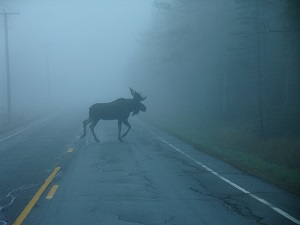
Drivers need to be alert and cautious because moose are on the move, according to the Vermont Fish & Wildlife Department. Moose are more likely to be crossing roadways at this time of year, especially after dark or early in the morning because this is breeding season for moose.
Moose are a threat to motorists, but there are measures you can take to avoid hitting them, according to Fish & Wildlife:
Always be aware of the danger -- moose cross the road randomly, as well as at their regular crossings.
Increase your roadside awareness and reduce your speed when you see MOOSE CROSSING signs along the highway. When on secondary roads, the recommended speed is 40 mph or less in these moose crossing areas.
Drive defensively and don't overdrive your headlights. Moose are more active at night and early morning, and they are difficult to see because of their dark color.
If you see a moose ahead, slow down or stop. Trying to speed past them before they can move can be a serious mistake.
Vermont highway sections most frequented by moose:
-Rt.105 from Island Pond to Bloomfield.
-Rt.114 from East Burke to Canaan.
-Rt.2 from Lunenburg to East St. Johnsbury.
-Interstate 91 at Sheffield Heights.
-Interstate 89 from Bolton to Montpelier.
-Rt. 12 from Worcester to Elmore.
-Rt 118 near Belvidere Corners and the Rt. 109 intersection.
Nineteen people have died in motor vehicle collisions with moose on Vermont highways since 1985.
For Immediate Release: October 4, 2018
Media Contact: Col. Jason Batchelder 802-828-1529
Commissioner Louis Porter 802-828-1454
